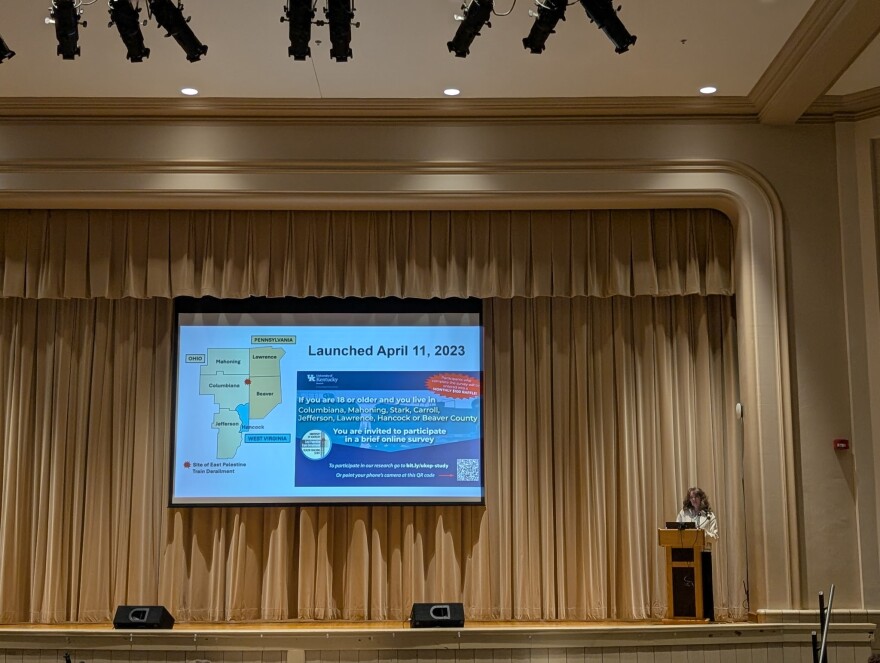More than two years after the fiery train derailment in East Palestine, researchers studying the public health impacts are beginning to share their findings with the caveat that much more research needs to be done to get the full picture.
The 2023 Norfolk Southern derailment upended life in the town on the border of Ohio and Pennsylvania. The accident led to first responders venting and burning vinyl chloride, a toxic chemical and a carcinogen, from derailed train cars. Since the accident, residents have complained of symptoms they say were caused by the spilled chemicals.
Wednesday night, East Palestine residents gathered to hear an update on research being conducted at various universities nationwide on the public health impacts of the accident.
Nearly two thirds of East Palestine residents participating in a small study showed signs in their urine of their bodies metabolizing vinyl chloride, Erin Haynes with the University of Kentucky said.

"In the CDC [Centers for Disease Control and Prevention] study, only 5% of the 1,000 people had it detected in their system," she said. "In Marietta, nobody had it, but in East Palestine, 74% of the 19 people had it detected in their system."
The University of Kentucky's data also shows how the researchers themselves were impacted by the derailment.
"When we first arrived - there's only four of us - but half of us had it on our system," Haynes said. "On day two, everybody did."
The levels were very low but still detected, she said.
Blood tests also found markers that could increase the risk for heart disease, stroke, cancer, diabetes and autoimmune disorders, she said.
"It indicated that there was this chronic low-grade inflammation and tissue repair," Haynes said, "and inflammation, when you have that in your body, can affect every organ, every body system."
The study is too small to be definitive but points researchers in the right direction, she said.
"Is that 19 people super actionable? No, but it also warrants further study," she said, "and it says, 'Yes. This is the route. You need to point your nose and go."
The University of Kentucky plans to launch a bigger study to better understand the impacts of the derailment, Haynes said. The research has received additional federal funding to do so, she said.
"We want to be able to share the data with the public health professionals that then can be more proactive in their preventive care with the patients and then give them some action steps from a healthcare point of view," Haynes said.
Earlier research from the University of Kentucky found that levels of dioxins, a group of toxic chemicals, were below or within range of levels found in a national CDC study. Another project had participants wear silicone wristbands that measure exposure to chemicals. No dioxins were detected in any of the wristbands.
A survey of East Palestine residents completed this spring by the University of Kentucky found 70% of participants reported nose irritation, sinus drainage and sore throat, 40% reported coughing and wheezing, 42% reported headaches and 25% reported tiredness or weakness. Of women aged 18 to 45, 33% reported experiencing issues with their menstrual cycle. Nearly a third of participants screened positive for post traumatic stress disorder. Of school age children that completed the survey, 73% reported nose irritation, 63% reported coughing and 51% reported headaches.
A research team at Case Western Reserve University has also been studying exposure from the derailment.

"An individual's odds of having new pulmonary symptoms, again breathing symptoms, decreases by 11% for each mile further away from the derailment that they are," Anthony Orsino, a researcher at Case, said.
Researchers are still comparing potential DNA damage to geographical distance and direction from the train derailment site. The study is also looking at how the derailment has impacted quality of life, stress, future and overall health. The research team is still recruiting both adults and kids for the study.
The Columbiana County Health District has been continually sampling private well water since February of 2023.
"We've not found any exceedances related to the derailment to date," Environmental Director Laura Fauss said, "and that sampling is ongoing."
The health department has received additional federal grant funding to continue testing private wells for several more years, she said.
The University of Kentucky also studied indoor air quality, finding levels similar to indoor air across the U.S.



